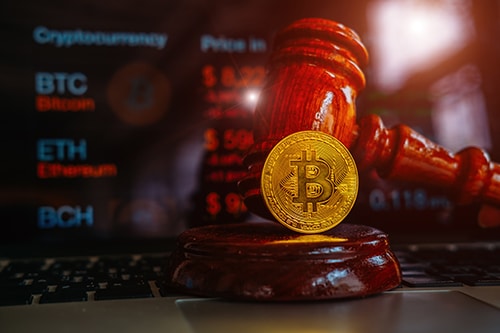It has been a rough month for cryptocurrency enthusiasts. Between two major exchange hacks and the recent collapse in cryptocurrency prices, “hodling” for many has become increasingly challenging as of late.
The situation has not been helped by many mainstream media outlets’ insistence that these events—the hacks (specifically the one on Coinrail) and declining prices—were related to one another.
Indeed, many media outlets, including Bloomberg, the Wall Street Journal, the Guardian and Reuters were quick to assume causation where there may only have been correlation: A hack and a crash occurred on the same day, but that does not necessarily mean that one caused the other.
Aside from falling prey to the most basic error in statistics, these headlines reflect a lack of understanding about the distinction between cryptocurrency exchanges and cryptocurrencies themselves.
While it is certainly true that some of the more skittish cryptocurrency investors may have sold their holdings in response to the Coinrail hack, I do not believe this is enough to explain the recent downturn—particularly when bearish trends in a relatively small market seem like an equally plausible explanation.
The reality is that hacks on cryptocurrency exchanges should not dissuade anyone from their faith in cryptocurrencies; rather, bitcoin exchange hacks highlight the reasons why we need cryptocurrencies in the first place.
Exchange Hacks are the Failings of Centralized, “Trusted” Third Parties

Satoshi Nakamoto, the proverbial father of modern cryptocurrencies, described in the Bitcoin white paper that his primary goal was to create an online payment system that was superior to the ubiquitous “trust based model”, which connects merchants to consumers through a trusted financial intermediary (e.g. a payment provider like VISA or a bank).
Bitcoin itself succeeds in accomplishing this goal; it facilitates trustless, direct payments through a peer to peer network called a blockchain. The system works, but only for those who already own Bitcoin. As for how people were supposed to acquire Bitcoin in the first place—on this, Satoshi was inexplicably quiet.
This oversight created a need in the market for services that would allow users to exchange fiat currency for Bitcoin.
Sure enough, exchanges began popping up to fill that need, but cryptocurrency exchanges were not necessarily governed by the same sorts of ideals that motivated cryptocurrencies. Exchanges were more centralized; they looked much more like companies or—dare I say—banks.
In the context of an industry so hellbent on decentralization, centralized exchanges seem strangely out of place. The cryptocurrency community, for their part, appears willing to overlook the contradiction—relying on centralized exchanges to buy decentralized currencies—perhaps because at this point there is simply no getting around them.
Centralized exchanges are the gatekeepers to cryptocurrency: they are the primary point of entry for anyone looking to invest in the space. From the outside looking in, however, exchanges like Bitfinex, Binance and Coinbase have very little in common with the cryptocurrencies they purvey. They are centralized, for-profit organizations that require users to place in them an immense amount of trust.
Unfortunately, history has shown that this trust is often undeserved. Cryptocurrency exchanges have been the targets of an inordinate amount of theft, totalling hundreds of millions of dollars over the years.
To be fair, one has to sympathize with exchanges for the position that they are in. Consumers don’t see it, but exchanges are engaged in a never-ending game of cat and mouse with would-be hackers looking to steal everything they have. Exchanges have to be on high alert at all times, trying to discover and plug up any security flaws before cybercriminals can get to them first.
Much of that sympathy goes out the window, however, when you learn how much money exchanges are making. Binance, which consistently ranks in the top 5 exchanges by daily trade volume reportedly made $200 million in its second quarter of existence. We have covered Binance extensively in other posts.
As Charles Hoskinson, co-founder of Ethereum and more recently the founder of Cardano said in an interview:
“If they’re going to be worth this much money, shouldn’t we at least demand that somebody spends a few months of fucking time to go to the world’s top people and get those people to give it a little checkmark…that’s just common sense.”
Hoskinson’s comments were about ICOs, not exchanges, but the logic still rings true.
It raises the question: Are cryptocurrency assets uniquely difficult to protect or are many exchanges simply not up to the task of protecting them?
Either way, as Charlie Lee pointed out in a recent interview on CNBC’s Fast Money, exchange hacks don’t “change the fundamentals of Bitcoin and other cryptocurrencies.”
Bitcoin has never been hacked. Litecoin has never been hacked. Ethereum experienced the DAO hack but was able to return all investor money—albeit controversially. Each of these cryptocurrencies is no less valuable, just because certain exchanges do not have the proper security measures in place to protect them.
In fact, the shortcomings exhibited by cryptocurrency exchanges—reliance on trusted third parties, centralization, single points of failure—are the same flaws that inspired cryptocurrencies in the first place, and consequently, the same flaws that cryptocurrencies are explicitly designed to avoid.
For this reason, I would argue that anyone giving up on cryptocurrencies because of the failures of exchanges has missed the point.
How Concerned Should We Be About Exchange Hacks?
While I don’t believe that exchange hacks are a rational reason to abandon cryptocurrencies, they are undoubtedly a problem for the cryptocurrency industry.
Exchanges are the primary interface through which many users interact with cryptocurrencies. Improving the user experience on exchanges, particularly through improved protection of user investments, is a necessity if cryptocurrencies are ever to achieve mainstream adoption.
The simplest way to protect user investments actually has more to do with users than with exchanges; transferring one’s cryptocurrencies into a secure, offline wallet when not actfively trading has been widely recommended for some time.
But some responsibility must fall at the feet of exchanges themselves. If exchanges are going to take on the role of “trusted third party” in the cryptocurrency industry, then they must become deserving of that trust.
But how?
Embracing the Positives of Regulation

“Regulation” is a bad word in many cryptocurrency circles. The sentiment is understandable, especially coming from those with more Libertarian political philosophies. But regulation of cryptocurrencies has already begun and shows no signs of slowing down. In fact, many of the most controversial regulatory actions are already taking place.
Perhaps the best example is Coinbase, generally considered to be among the most popular exchanges in the world, which was ordered by a federal judge in November, 2017, to share user data with the IRS.
Anonymity and privacy are among cryptocurrency enthusiasts’ most prized qualities. Frankly, it’s difficult to think of a more egregious regulatory outcome than this.
It’s not just in the U.S. either. Japan’s Financial Services Agency (FSA) has also begun cracking down on cryptocurrency exchanges, recently revealing a five-point agenda for regulating exchanges including stricter Know Your Customer (KYC) rules.
As I said, it is easy to see why many cryptocurrency enthusiasts are rubbed the wrong way by these kinds of regulations. But given the fact that we are already forced to endure many of the negative outcomes of regulatory actions, we may as well embrace the positives.
For example, three of the remaining points in the FSA’s five-point agenda for cryptocurrency exchanges are regulations that many cryptocurrency users might consider good changes: stricter security standards (including mandatory cold storage and two-factor authentication), separation of consumer assets from company assets, and clearer organizational structures to prevent insider trading.
Regulations like these may in fact be the best tools available for making exchanges more reliable and more deserving of our trust. And while it’s a bitter pill to swallow, creating better exchanges will be a positive step for cryptocurrencies as a whole, if only because exchange hacks will no longer distract from the transformative power of cryptocurrencies themselves.



